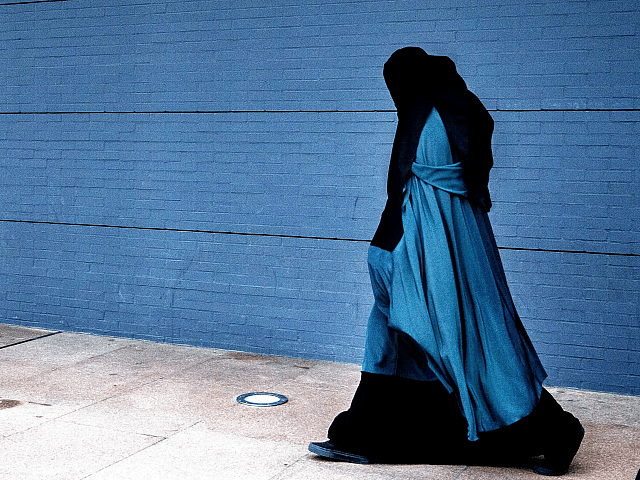The Taliban’s “Ministry of Promotion of Virtue and Prevention of Vice” has peppered Kabul with posters mandating women wear hijab but illustrated with the full-body burqa covering, Afghanistan’s Khaama Press reported Monday.
The Taliban ruled Afghanistan throughout the 1990s before returning to power in August, the product of former President Ashraf Ghani abruptly fleeing the country and President Joe Biden breaking an agreement with the Taliban that kept it from storming the country. Taliban spokesmen have insisted that they would respect women’s rights and only request that they wear hijab, or a hair covering, to abide by the Islamic sharia. During the previous Taliban regime, the jihadist organization forced women to wear burqa and largely prevented them from leaving the house, much less participating actively in society.
In the 20 years that the Taliban was out of power, the Afghan government allowed women to have jobs, an education, and join the military – all of which seem in peril despite repeated Taliban assurances of an “inclusive” government.
No country in the world has recognized the Taliban as the legitimate government of Afghanistan at press time, though rogue states like China, Russia, and Iran have maintained diplomatic exchanges with Taliban terrorist leaders.
The posters surfacing in Kabul read, according to Khaama’s translation, “Based on the Sharia law, a Muslim woman must observe hijab because this is a commandment of Sharia law.” The poster does not have an illustration of a hijab on it, however – only burqa and niqab, a full face covering that, unlike the burqa, allows the eyes to be exposed.
Taliban's religious police have erected posters in #Kabul ordering women to wear the Islamic hijab.
"According to Shari'a law, a Muslim woman must observe the hijab."
Posters shows a woman wearing a burqa and a woman wearing a black chador. pic.twitter.com/e43pahtAvw
— Frud Bezhan فرود بيژن (@FrudBezhan) January 9, 2022
“Officials of the ministry said that the placards are only to recommend hijab and encourage women to observe hijab and that no one will be allowed to force women to wear hijab,” according to Khaama Press.
The move comes a week after the Taliban “Virtue Ministry” implemented a car checkpoint system in the capital city to impose sharia. The checkpoints allow Taliban terrorists to stop passengers at random and berate them with various fundamentalist Islamic demands, such as lecturing men to grow their beards out and urging them never to seat a woman in their car without a hijab. The Taliban has also issued a soft ban – meaning the terrorists are enforcing it but, like the hijab, claiming it is only a suggestion – on music.
In Afghanistan’s #Kabul, the Taliban members ask cars to pull over & tell men in the cars to let their beard grow, not to listen to music & avoid looking at women who don't have hijab. The #Taliban say that’s life according to Sharia. #TalibanTakeover pic.twitter.com/oVMJRNZOsR
— Aati (@AatiSheerazi) January 2, 2022
The “Ministry” has also begun targeting alcohol. A video published by the Taliban’s “General Directorate of Intelligence” last week showed jihadists in Kabul dumping barrels of alleged confiscated oil into a canal, announcing the Taliban would enforce the sharia ban on its consumption nationwide.
Women in the country, especially in Kabul, have responded to the escalating pressure to conform to Islamic fundamentalism with protests, both overt and covert. The Taliban has, surprisingly, permitted several peaceful protests by women in Kabul, but a growing number of these demonstrations have attracted violent assaults by armed jihadis. The terrorists have assaulted both protesters and journalists covering the events but have failed to stop them from happening.
The Afghan news agency Tolo News reported Monday that women demanding respect for their basic human rights have recently switched tactics and begun using graffiti to send messages against the Taliban regime. Scribbled anti-regime writings have surfaced throughout the city, demanding freedom for women to participate in society and girls to receive an education.
“The women denounce the increased restrictions against them, and write their demands on walls, including slogans calling for girls’ right to education, women’s right to work, women’s choice of clothes and the inclusion of women in social and political life,” Tolo News reported.
“Our protests were met with threats and violence, so we switched to murals to achieve our fundamental rights and will continue these protests,” a woman named Tamana Rezaie told Tolo, admitting to participating in the graffiti protests.
Another protester identified only as Leda confirmed that the change in tactic was necessary because of the physical violence perpetrated against women who demanded being allowed to practice basic freedoms.
Tolo News cited a Taliban spokesman insisting, “The Islamic Emirate (Taliban) has not created any obstacles in the way of women’s rights.”
Taliban jihadists have insisted on inclusion and support for women since their takeover, despite their long trajectory of rampant human rights abuses. Most recently, Taliban spokesman Zabihullah Mujahid said the Taliban will find roles for women in the revamped Afghan military. The official government armed forces of Afghanistan, the Afghan National Defense and Security Forces (ANDSF), collapsed in August. Mujahid did not specify in what form women would serve in the armed forces or if there were any limitations, however. Taliban officials also announced last week that the new Afghan military would have a special force of suicide bombers.

COMMENTS
Please let us know if you're having issues with commenting.